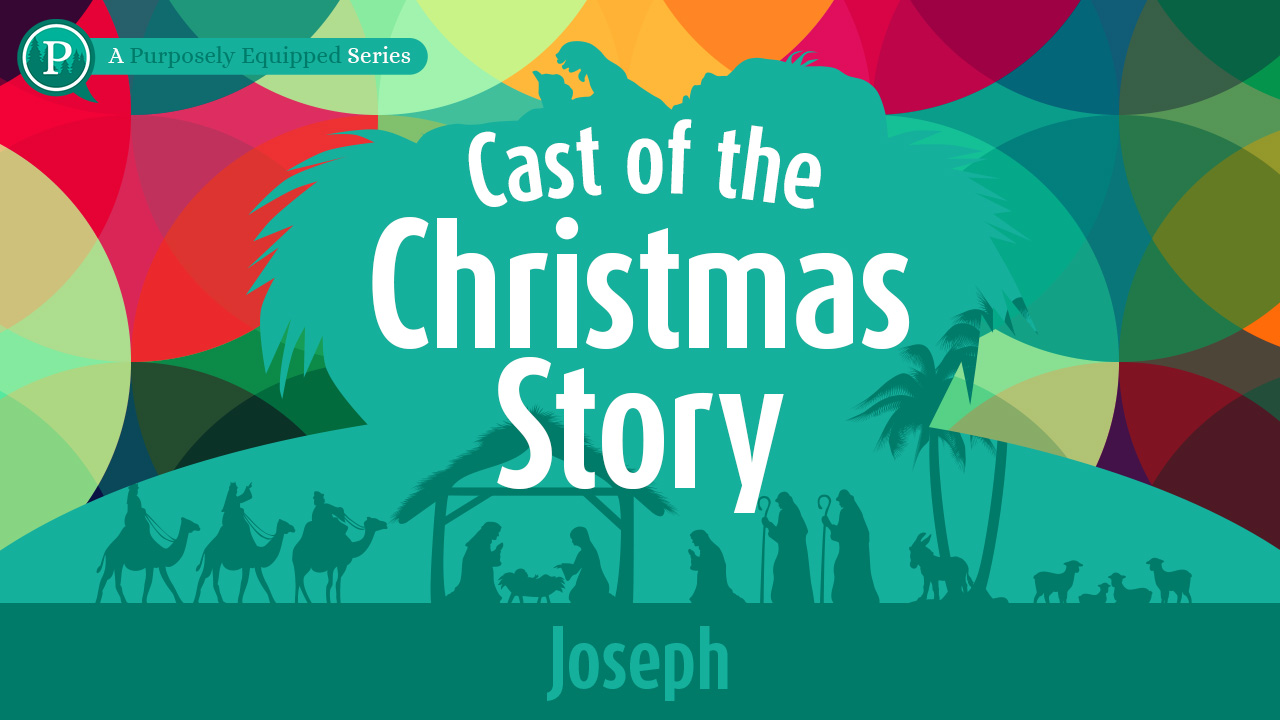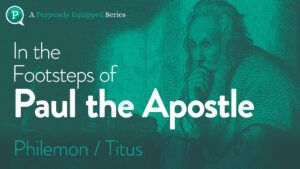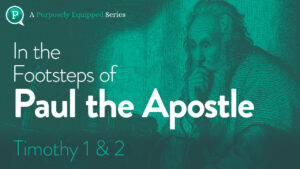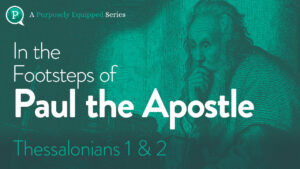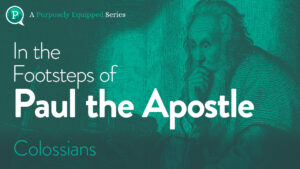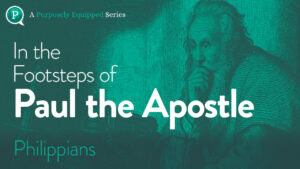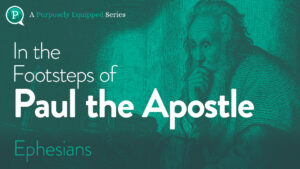There are so many ways Joseph could have reacted when he found out Mary was pregnant. Pastor Riley Taylor from Mountlake Church joins Mark to talk about Joseph, his character, and why he and his response are so important to the Christmas story. What can we learn from Joseph’s response for our own lives?
Special thanks to World Concern Global Gift Guide, for bringing us the Cast of the Christmas Story!
Show Notes:
Transcription:
Purposely. Your life, God’s purpose. Listen at OnPurposely.com.
Mark Holland:
The Cast of the Christmas Story series is sponsored by World Concern and the Global Gift Guide. Find out more at Globalgiftguide.org.
Speaker 1:
The Cast of The Christmas Story.
Mark Holland:
As we continue into the Cast of The Christmas Story, I got a pretty big player this time as we talked to Riley Taylor. Now, last time you helped us with our Easter series, Riley. Welcome to the studios here. And since we talked last time, it’s no longer Calvary Fellowship in Mountlake Terrace. You’ve changed the name of the church.
Riley Taylor:
That’s right.
Mark Holland:
Why? And what is it now?
Riley Taylor:
We’ve been Calvary Fellowship for 46 years.
Mark Holland:
Yeah.
Riley Taylor:
We just changed our name to Mountlake Church. So our website now is Mountlake.church. And we’ve been planning this for quite a long time. I actually bought the website in 2019 but something happened in 2020 to postpone our…
Mark Holland:
Now why did you do this? 46 years, that’s quite a legacy.
Riley Taylor:
You want to know what’s funny? I took over the church for my dad and the first…
Mark Holland:
Wayne Taylor.
Riley Taylor:
Wayne Taylor.
Mark Holland:
A local icon.
Riley Taylor:
He is. And the first thing he told me was, “Riley, when you take over this thing, you should change the name.”
Mark Holland:
Really? He did say that?
Riley Taylor:
And I was like, “Dad, why?” He goes, “I’ve never liked the name Calvary Fellowship.”
Mark Holland:
Okay, I see.
Riley Taylor:
So there you go.
Mark Holland:
There you go.
Riley Taylor:
You know what’s funny? Actually, we had church yesterday and a woman came and visited. So we were talking to her and she goes, “I’ve lived here my whole life. I never knew this was a church and now that you changed the name, there’s church on the sign.” She goes, “I just realized it’s a church. I never knew what a Calvary Fellowship was.”
Mark Holland:
It was like a conversion of an old grocery store, wasn’t it?
Riley Taylor:
That’s right.
Mark Holland:
Okay. I remember Calvary Fellowship when it was in the U District for many years.
Riley Taylor:
That’s right.
Mark Holland:
And we met at a high school down there. That was right at the beginning of my Christian walk was going to Calvary Fellowship in the U District.
Riley Taylor:
That’s right.
Mark Holland:
So a long relationship with Calvary Fellowship in the Northwest. You’re the pastor there for how long now?
Riley Taylor:
Five years.
Mark Holland:
Five years. Took over from dad. A lot of interesting projects you’re involved in. Last time, again, when we saw you, you were talking about some films that you guys were working on and now it looks like you’ve actually produced one. Now these are films about the parables. Little movies about the parables.
Riley Taylor:
I’m calling the project Pacific Parable and it’s an adaption of seven of Jesus’s parables. We started with the Buried Treasure. The Kingdom of God is like treasure hidden in a field which a man stumbled upon and in his joy, he covered up the field, sold everything he had, and bought the field. So we tell a story of a couple, a farming couple, in 1880s Washington State. This was during the rush to the Northwest. This is when Washington was incorporated as a state. And the story goes that all of these pioneers came to the Northwest to settle and to farm the land. Some did very well and some did very poorly. Our story focuses on a couple that were doing very poorly and all kinds of tragedy has hit and their land is not producing until the wife stumbles on buried treasure. And the drama of our version is that she has to convince her husband to sell everything they have in order to buy the field.
And that plays into the story. Jesus is saying, “Hey, the Kingdom of Heaven is worth giving everything for.” And we tap into the fact that that’s not always easy. So we’re wrapping it up next week. We’re mixing a 5.1 surround sound mix down at a studio.
Mark Holland:
Yeah, you showed me a little bit of it there on your smartphone. And by the time these air in December, they probably should be available. So find out more at your website. What’s your new website again called?
Riley Taylor:
Mountlake.church, and the project will be on Pacificparable.com.
Mark Holland:
Okay, we’ll find out more about that. But what we’re here to find out about this time is The Cast of the Christmas Story.
Riley Taylor:
Right.
Mark Holland:
You got a pretty significant player and that is Joseph.
Riley Taylor:
Joseph.
Mark Holland:
So we talked a little bit before we started recording. Tell us your initial thoughts about Joseph and the part of the Scripture that describes his life.
Riley Taylor:
When you guys invited us to come on, I actually was like, “Can I please have Joseph?”
Mark Holland:
Okay, you must’ve said you wanted to do it early.
Riley Taylor:
I did. I was like, “Please just give me Joseph.” I think why? Is because him, Mary, a couple other characters in the account, they are described with some amount of detail as to what’s going on in their minds.
Mark Holland:
Some of them are very, very little information about them.
Riley Taylor:
Yes, I know that you’re…
Mark Holland:
The high priest. Who’s that?
Riley Taylor:
Who’s that?
Mark Holland:
Archelaus, I’d never heard of Archelaus.
Riley Taylor:
Yeah, and you’re like…
Mark Holland:
I don’t want to be the people who got those. But you’d be surprised. People have been able to pull out all kinds of information about everybody in this cast. And
Riley Taylor:
That’s the amazing thing about Scripture. There’s so much there beneath the surface. It really encourages diving deep. But Joseph is given his own little character arc. If we were to adapt it for a film, we would have a lot to go off. So not only is there detail in his character but I really relate to the detail. So I just love his story and what he was going through and how he overcame and how God was there for him.
Mark Holland:
Okay, it’s mentioned in Matthew 1:18-25. Why don’t you read that?
Riley Taylor:
Okay, I will. Matthew 1:18. Now the birth of Jesus Christ took place in this way. When his mother Mary had been betrothed to Joseph, before they came together, she was found to be with child from the Holy Spirit. And her husband Joseph being a just man and unwilling to put her to shame, resolved to divorce her quietly. But as he considered these things, behold an angel of the Lord appeared to him in a dream saying, ‘Joseph, Son of David, do not fear to take Mary as your wife for that which is conceived in her is from the Holy Spirit. She will bear a son and you shall call his name Jesus, for he will save his people from their sins.’ All this took place to fulfill what the Lord had spoken by the prophet. Behold the virgins shall conceive and bear a son and they shall call his name Emmanuel, which means God with us. When Joseph woke from sleep, he did as the angel of the Lord commanded him. He took his wife but knew her not until she had given birth to a son and he called his name Jesus.”
Mark Holland:
Definitely a messy engagement.
Riley Taylor:
Oh, yeah.
Mark Holland:
Not so much [inaudible 00:07:14] a lot of times people live together, they have children and then they get married. That’s the way it works in today’s world. But back then, that was definitely not going to happen.
Riley Taylor:
And that’s actually a good point because the drama of the story, isn’t it? So she’s engaged or it says betrothed. We don’t practice betrothal here but in that culture they did. So they’ve likely known each other for many, many years, grew up together possibly in their hometown. And it says Mary had been betrothed but before they came together, meaning before the wedding, before wedding night, she was found to be with child. Bom, bom, bom, bom. There’s the drama.
Mark Holland:
Right.
Riley Taylor:
And the key word here is she was found. Found by who? And it would be, Joseph, it would be her friends, probably her family, maybe her parents, found to be with child. And in that culture, much like today, we like to think that we’re forward-thinking and progressive and stuff. But the reality is these are messy situations no matter what culture you’re in. And Joseph had not been with her. So what’s he thinking? He’s thinking, “Uh… What did you do?” So there’s a sense of betrayal, of hurt, of confusion, all that. So that’s the drama of the story. And I just love that it starts that way. It actually goes to a point. Now the birth of Jesus Christ took place in this way. And I just go, “Why? Why did it have to take place in that way?”
Mark Holland:
Why did it have to take that place that way? Before we started recording, you were offering some of your ideas on why. Other than that she had to be a virgin and God had to be the Father and not Joseph.
Riley Taylor:
And it gets into that. That which is conceived in her is from the Holy Spirit. The virgin birth, the conception of the son of God. He is fully God and truly man. And that is a crucial doctrine. This is basic Christianity. Galatians 4, born of woman is crucial according to our creeds, virgin birth, I believe in the virgin birth. So this is…
Mark Holland:
That’s central. That’s not something you can just, Virgin just meant a young girl.
Riley Taylor:
That’s right.
Mark Holland:
We believe it means Jesus was conceived by the Holy Spirit.
Riley Taylor:
Exactly. And that’s what the plan of God was, to enter into human history as fully God, truly man. So this is how that happened. So they’re not married and the Holy Spirit comes upon Mary to bring within her or conceive within her a child born not of human reproductive processes, but of God. So it’s a miracle. This is a miracle. People say, “How could you believe in virgin birth? That’s so ridiculous.” I go, “Yeah, of course it’s ridiculous. It’s a miracle. It’s a miracle.” The Bible doesn’t ignore the fact that it’s ridiculous. Joseph felt that ridiculousness firsthand. So messy engagement.
Mark Holland:
And he was mad. You were saying some of these words can be translated. He was fuming.
Riley Taylor:
Yes. So in verse 20, my version says, “But as he considered these things, the problem with that is that it’s a charitable translation of the word. The actual word in Greek is [foreign language 00:10:59]. I’m not a Greek scholar, but it could be translated anger within. He was fuming over these things. That’s one translation. As he fumed over these things. Which explains why when the angel appears, he says, “Okay, Joseph do not fear.” He had fear. He was disturbed. He was probably barely sleeping. He was just tossing and turning. This was probably weeks of torment in his heart. And he was thinking through it. And yet verse 19 says, “He was a just man and he was unwilling to put Mary to shame and he had resolved to divorce her quietly.” Now to our reading, that might not make a lot of sense, but let me just paint the picture. When it says he’s a just man, that means that he obeyed the Torah. He loved the Lord. He walked with God. He did everything right.
And yet he wasn’t just a man of truth who was like, I don’t know, a jerk or self-righteous. He was also a man of mercy. He was unwilling to shame her, which might’ve been an option. And many people in that culture might’ve said, “That’s what you should do. Make a public example of her.” That happened a lot. It happened a lot. And actually Jesus himself was questioned about that. Remember in Matthew 19 when the Pharisees come and say, “Hey, can a guy divorce his wife for any reason?” And Jesus was like, “You’re just going around trying to shame these women in your life?” And he goes, “No, that’s adultery. You divorcing your wife is adultery.” And that was a shock to their system. Similar to Joseph. Joseph got that. So his plan, it says, was to divorce her quietly, which really just meant keep it out of the public eye and let her live out her life with her child, probably supported by her family.
Mark Holland:
So he had a lot of character.
Riley Taylor:
Yeah.
Mark Holland:
Not just truth, but grace.
Riley Taylor:
Exactly.
Mark Holland:
He was a graceful man. So we always hear what exemplary person Mary was but so was Joseph.
Riley Taylor:
They both were.
Mark Holland:
They both were.
Riley Taylor:
They both were examples of who men and women ought to be in the Kingdom of God. And yet, as you know, just because you’re just and righteous and merciful and gracious, doesn’t mean life is easy. He’s disturbed, he’s fuming, he’s fearful, he’s confused. So what I love and what I relate to, I don’t relate to him being a great man of character. That’s not what I’m saying. What I relate to is just the messiness that it says this is how the birth of Jesus took place. It took place in this way for two reasons. First and foremost, we covered the virgin birth. Crucial. Fully God, truly man.
Mark Holland:
And we could unpack all kinds of theological things about that too.
Riley Taylor:
Exactly.
Mark Holland:
But we won’t in this podcast.
Riley Taylor:
But listen, we should never miss what the virgin birth means. It means that God himself enters into our messy engagement, enters into our sinful world. As the text goes on to say, “Call his name Jesus, for he will save people from their sins.” And it goes on to say, “You shall call his name Emmanuel, which means God with us.” The virgin birth is not some abstract doctrine. It’s a glorious truth that the God of the universe has come into your family. And in the same way that Jesus enters into Joseph’s family, messy family, he enters into my messy family. He enters into your messy family and our messy families. So that’s the glorious truth of the virgin birth and of the story of Joseph.
Mark Holland:
Messy but again, back to the character of these people, God had to use this method with a couple that he could trust. Is that the way to say it?
Riley Taylor:
I think so.
Mark Holland:
Or I think that he knew could carry out.
Riley Taylor:
I think so.
Mark Holland:
He knew, God knew, that this was going to be difficult and not just anybody could handle this.
Riley Taylor:
There’s a story at the end of the Gospel of John where Jesus is on the cross and in front of him is his mom, Mary, accompanied by the apostle John. And Jesus says to the woman or to his mom, “Woman, behold your son.” And he says to John, “Son, man, behold your mother.” And there he’s handing care of his mom off to John and church history tells us that she was taken care of by him. And what this tells us is that Joseph, Jesus’s earthly father, was out of the picture.
Mark Holland:
He was definitely out of the picture by [crosstalk 00:15:50]
Riley Taylor:
Yeah, he might’ve been dead. Most likely he was dead because he’s written out of the narrative. And even in interactions with his family, his brothers and sisters, Joseph’s not there. So we can reasonably assume that at a certain point, Joseph died and Jesus became the primary caretaker which is why he had to hand care off to John. So my point there is that I believe Jesus is an example of being raised by a godly father, that Jesus was raised by a just, merciful, gracious man named Joseph. Obviously Joseph was not perfect and Jesus was. And we can speculate on how crazy that must’ve been. But we shouldn’t miss the point that Jesus had a good father. And that’s a beautiful picture. And I think an encouragement for us. Men like you and me, we want to be good. Don’t we? We want to be just. We want to be merciful. But it’s not always easy. It’s very messy. And so the lesson is we need Jesus to come into that mess, to train us to be men of God and of good character.
Mark Holland:
The lineage that Jesus had to have to be again, the proper person, to be the Messiah. The line of David, I thought it came from Joseph, but you say it came from both of their life, both Joseph and Mary.
Riley Taylor:
That’s right. Yes.
Mark Holland:
And where do you get that?
Riley Taylor:
I’d have to do some digging here.
Mark Holland:
Sorry. We can edit this part.
Riley Taylor:
I just remember studying it for myself and going, I thought the same thing. And then it was like, “Oh no, actually Mary as well.”
Mark Holland:
So I’ve always thought that Jesus’s divine attribute comes obviously from Mary and the virgin birth. So it shows that ultimately his father is God but his earthly lineage, his earthly meaning behind his role as the Son of David, that came through the line of Joseph and going back to Bethlehem for the census and all that.
Riley Taylor:
Yeah, it’s definitely emphasized that here, Joseph is called Son of David and later on in Luke chapter one, same thing. She was betrothed to a man whose name was Joseph of the house of David.
Mark Holland:
Mm-hmm. So it definitely came through Joseph.
Riley Taylor:
Definitely came through Joseph.
Mark Holland:
But we think it also came through Mary as well.
Riley Taylor:
Yes.
Mark Holland:
So she has some background with the line of David. That’s again another part, another level of the story. But again, Jesus had to fulfill so many things to be the Messiah and one of them was from the House of David.
Riley Taylor:
That’s right. That was a crucial, crucial piece of it because the promised King would come of the lineage of David. That’s 2 Samuel chapter seven. The promise is that from you, will come a future king of whose Kingdom there will be no end. And so Jesus comes into that role as king of Israel, but also king of the world. So the king of Israel would become the king of our world. And that happened through the line of Joseph. Yeah.
Mark Holland:
Tell us, you discovered some things about when Joseph woke up from his dream and the angel appearing to him.
Riley Taylor:
Right. So he’s fuming over this considering, confused, tossing and turning. The angel says, “Do not fear.” And he says, “That which is conceived in her is of the Holy Spirit. Call his name Jesus. He will save his people from their sins.” And if you dive into the meaning of the word Jesus, the name Jesus, it’s a contracted Yahweh and sozo, which means salvation. The Lord saves. Yahweh saves. And it says, “For He will save his people from their sins.” So the assurance and the the promise, “Don’t fear, Joseph,” comes from learning who Jesus is and what God was up to. So in verse twenty-four, it says, “Joseph woke up and he goes, ‘Oh, okay. Now I get it.'” I think there’s a moment there where we need to learn how to go, “Oh, okay, despite what’s going on in the mess of my life or my relationships or whatever, I am going to try and see what God’s up to here.”
And from that place of faith, it says, “He did so. He did as the angel of the Lord commanded.” He took his wife, they got married, but he knew her not until she had been given birth to a son and he called his name Jesus. Joseph is not just an example of a man of good character and a good heart. He was a man of obedience. He took what the Lord said and said, “Okay, I’m going to walk that out.”
Mark Holland:
The lessons from the life of Joseph. Jesus again had such wonderful parents and we can thank the Lord for them, both Mary and Joseph were of high quality. And for people who are listening to this, the Cast of the Christmas Story, and Joseph in particular, what he says to our lives today, why don’t you pray for people who are listening today? They’re in the middle of a mess. Some kind of family situation. Seems like Christmastime brings out all kinds of family dynamics like no other time of the year.
Riley Taylor:
So true.
Mark Holland:
People need hope. They need assurance. They need inspiration from people like Joseph in the Bible. Pray for those people.
Riley Taylor:
I love that, Mark. God, I want to pray right now for those like Joseph who are fuming, who are disturbed at the mess of their life. For Joseph, that mess came from You. You brought it upon him but You had a purpose to it. And we believe that no matter what we’re going through, the mess, the brokenness, we believe You can work through it. But what it requires is You to come into it, You to enter and to incarnate in the midst of our family or relationship, workplace, career path, school environment, wherever we’re at, Lord, we need You to come into it. I just think of Martha who talked about Jesus as the one who came and who is coming into the world. Lord, You came. That’s what we celebrate at Christmas. You’re coming. But You’re still coming. You’re still entering into the mess of our life. We believe that. So I pray right now that Y.
You would enter into people’s lives, solve the problem, God, comfort the pain, heal, Lord, the brokenness, and just show up in the exact way You did with Joseph. And may we wake up and go, “Okay, I trust You now.” Amen.
Mark Holland:
The cast of the Christmas story series is sponsored by World Concern. You can give a gift with a lifetime of impact. Your gift will meet the critical need of a child or family living in poverty. You can give a goat or one of 43 other life-changing gifts today through the World Concern Global gift guide. Give life-changing gifts that work together to transform the lives of moms, dads, and children in the world’s poorest places. You can even select a meaningful gift in honor of a friend or a loved one. Each gift transforms the life of someone in poverty. Go to Globalgiftguide.org. Again, that’s Globalgiftguide.org.
Speaker 1:
Thank you so much for joining us for the Cast of The Christmas Story, a series on Purposely Equipped. We’d love for you to take a moment and let us know what you think of this series by leaving us a review. For more podcasts to grow your faith, we invite you to visit Onpurposely.com. Until next time.
Follow this podcast:

